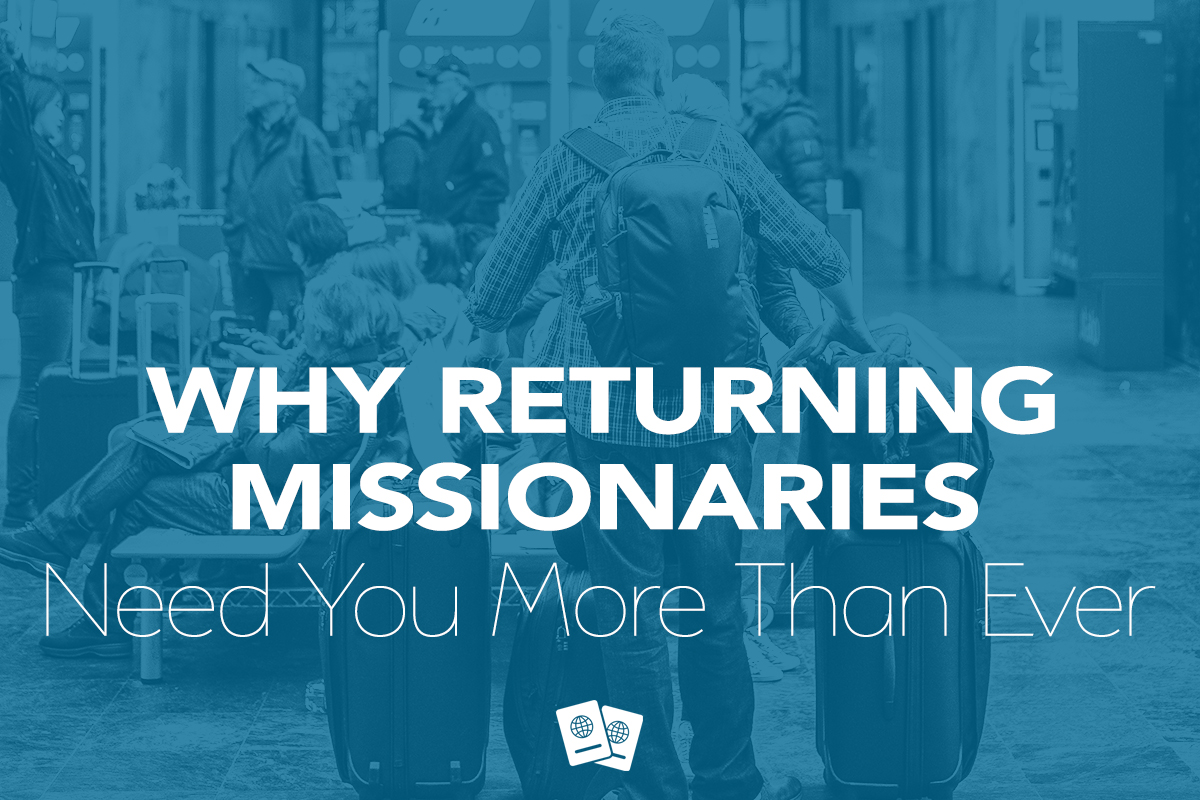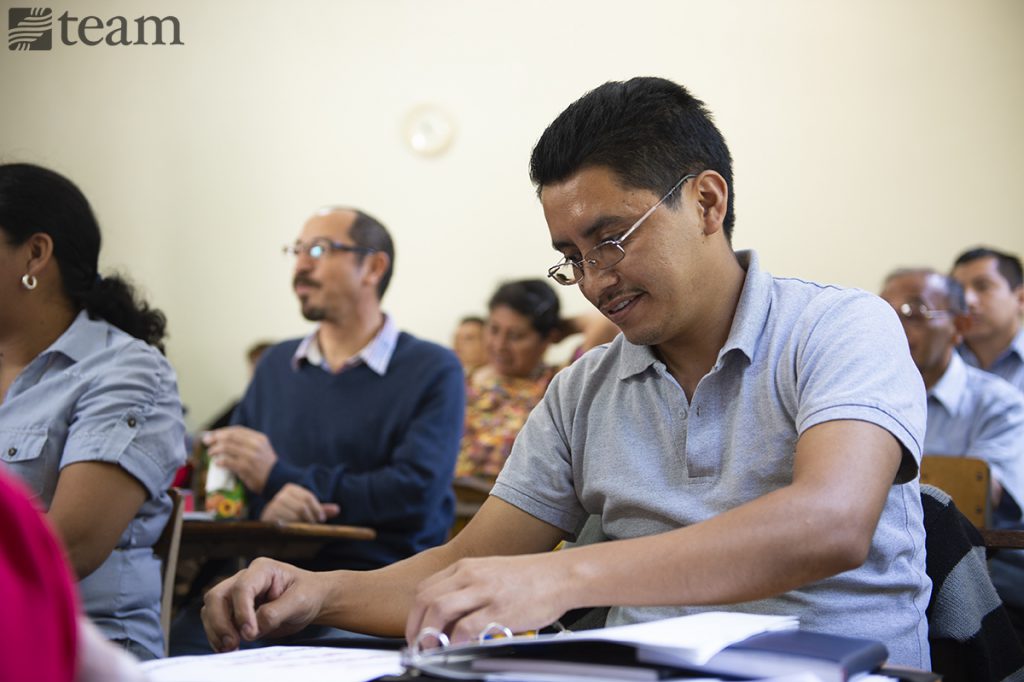
Missionary Life, Sending Churches
8 Ways to Serve Missionaries Coming Home
February 26, 2020
by admin

When Karyn left for the mission field, she thought she’d never return. She gave up her job as a high school English teacher and planned to retire in Japan. But 19 years in, things took a turn.
Personal matters brought Karyn back to the U.S. By then, her teacher’s certificate had expired. She didn’t have money for a new certification. And the entire process of finding a job had moved from newspaper ads to online job boards.
It was a crushing experience — but a familiar one to many returning missionaries.
Ask missionaries about coming home, and they may describe the process as traumatic, painful or even “worse than going overseas.”
Those responses can be confusing to non-missionaries. But they make sense when you consider what reentry involves:
- You learned to live life in a foreign culture. It’s become second nature in many ways. But now everyone expects you to naturally fall back into your home culture’s rhythms.
- Everyone’s excited for you to be back home, while you’re grieving the loss of friends, a church family and a culture you love.
- Relationships and people have changed over the years, and so have you.
Now add on the stress of finding a job, supporting a family, walking your kids through reverse culture shock, finding a home and more. It’s a wonder returning missionaries cope as well as they do!
The good news is that churches, family and friends can all reduce the pain of coming home. And there are eight key places to get started.
1. Make Sure Missionaries Coming Home . . . Have a Home
Yes, we’re starting with a big one. There are easier steps on their way, but you can’t really begin on the other things if your missionary doesn’t have a place to sleep at night.
In an ideal world, every congregation would have a spare rental home or mother-in-law suite they could open to returnees. But there are also many other options.
- Recruit recent empty nesters as hosts. “Recent” is the key word here. You’re looking for couples whose kids have left, but who also haven’t downsized yet. They have spare bedrooms and bathrooms to accommodate a missionary or an entire family. This may be a stretching experience for the hosts, but it’s a great way to give to the Lord, without paying a cent.
- Look into local retreat centers. Many retreat centers have cottages or other accommodations that can house a family. And if they’re a Christian retreat center, they may be willing to offer a deal for missionaries who are coming home. In fact, here’s a state-by-state list of centers that cater to Christian ministry workers.
- Talk with other churches and local missions agencies. Put out the word that you have missionaries coming home, who need a place to stay. You never know what doors God will open.
- Help returnees look at apartments. If a returning missionary already has a job lined up, they may be able to start renting a place right away. While they’re still abroad, offer to tour apartments, take photos and ask questions.
Once you find a place for your returnees, make sure to fill their cabinets with food, toiletries and whatever other basics they might need.
Filling these very basic needs will lay a foundation of success for your returning missionary friends. And in a time of turmoil and change, it will make clear to them how much your church truly loves them.
2. Teach Them the Basics Again
A lot can change in five, 10 or 30 years. You may think your missionary is up to speed because they return on home assignment every few years. But a yearlong visit to raise support isn’t the same as setting up a life.
Dr. Dottie Schulz at Mission Resource Network says, “We assume that they understand everything, when they don’t remember how to get a driver’s license or how to sign up for health insurance or how to rent a house or how to get a job. They’re like foreigners coming in many times.”

Returning missionaries often need help navigating basic elements of American life. Think through how things have changed since they left home, and be willing to be their guide.
Even if they do remember how they did things when they left, things are likely different now.
Which things have been automated since they left? What new laws have been passed (consider traffic, taxes, healthcare, etc.)? How many things are now easier to do on the computer?
Get a group together to work through these questions. Make a list. Then make a plan for how you’ll get returning missionaries up to speed. That might mean writing a little guide. Or it may mean offering to go with them on these beginner tasks. Ask your missionary friend what would be most helpful to them.
3. Listen to Their Stories and Struggles
Hopefully, your returning missionaries will feel comfortable sharing their hearts with you. Most Christians would say this is exactly what they want.
But we often send a different message.
“We’re very friendly people,” Schulz says, “but we don’t listen. … [People] will say things to them like, ‘You’ve talked enough about Nigeria. You’re in America now.’”
But for the missionary coming home, life abroad isn’t an exotic story they tell. It’s life.
It’s people they miss and still pray for. It’s food they crave. It’s the view from their kitchen window. It’s missed opportunities and grand victories. We can’t expect returnees to stuff years of their lives in a box once we lose interest.
“We were more of a mess at 12 months than right after [we returned],” says Shonna Ingram, a former missionary to Tanzania.
Take time to listen. Even better, ask returned missionaries about their host country. Ask them about their struggles now. Keep asking, even when you think you’ve asked long enough. You may also consider paying for counseling so the missionary can process things with a professional.
When former TEAM missionary Aaron returned from the Middle East, it was sudden and unexpected. But a supporter told Aaron they could always talk about it — and he meant it.
“I really leaned on him a lot for the first six months,” Aaron says. “We talked on the phone a lot, he gave me a book that I read as a daily devotional. … That kind of connection with brothers who will keep pointing me to Christ, or sisters, is really important.”
4. Connect Returnees with Professionals in Their Desired Fields
One of the major challenges returning missionaries face is finding a job. Even if a missionary uses their professional skills on the field, they may use them on a smaller scale or for purposes that secular employers won’t understand.
In these cases, a strong professional network becomes a major asset. That’s where you come in.
As missionaries prepare to come home, ask them what jobs they’re interested in. It’s likely that someone in your church either works in that field or has connections with someone who does. Find out who these people are and ask them if you can connect them with your returning friend.
These people don’t have to give the returning missionary a job. But they can help by explaining how the field has changed and what employers are looking for. And they may know about openings in the area.
“Have a sense of who in your congregation has what backgrounds, who would be willing to go to coffee with people and talk about what it’s like,” says Ali Llewellyn, a missionary field trainer and business consultant.
5. Pay for Career Coaching or Continued Education
Peter served in missionary aviation with Wycliffe Bible Translators. When he returned from the mission field, he thought he would easily find a job.
What he wasn’t prepared for was an influx of military personnel returning to the country at the same time. Peter’s experience flying planes in the jungle couldn’t compete with people who had flown large planes for the military. And Peter struggled with the unwritten rules of job hunting.

Missionaries learn many transferrable skills on the mission field, but continued education and certification can give them credibility in the eyes of skeptical employers.
Thankfully, a supporter paid for several sessions with a career coach. The coach helped Peter figure out how to market his experience and skills to employers. Peter also began taking business classes at community college so he could earn a certification in project management.
Through coaching and affordable education, Peter found a new job in nine months.
Before your missionary comes home, consider paying for a career coaching session. And then ask them about what training they believe would be useful in finding a job.
If you can’t pay for community college classes, consider other ways you could help make continued education possible. Babysit the kids while Mom and Dad go to night classes. Set up a rotation of people to bring some weeknight dinners. Pray for them when they have tests or hard assignments coming up.
6. Provide Transportation
No, this doesn’t have to mean buying a car. But missionaries coming home do need transportation if they’re going to interview for jobs, take kids to school, buy groceries, come to church — you get the idea.
Many missionaries will have savings to buy a used car right away. But if they don’t, or if it takes time to find the right vehicle, there are a couple ways you can help.
- Talk with your congregation and see if anyone has a car they can give up for a time. This could mean a family sacrificially lends their second car. But it could also mean a shut-in shares the car they aren’t using anyway. Or perhaps someone delays selling their old car.
- If buying a car or sharing a car isn’t possible, consider setting up a carpooling schedule. Does anyone have kids going to the same school? Does anyone in your congregation have a schedule that would let them drive the returning missionary to job interviews? Once they’ve found a job, does anyone work in the same area?
No matter how you approach it, providing transportation requires sacrifice. But it is a vital way you can show love to your returning missionary.
7. Help Missionaries Coming Home Find Their Identity in Christ
It’s easy to assume that missionaries will do this better than anyone. The truth is, finding your identity in Christ can be one of the hardest struggles for a returning missionary.
“It’s worse than going overseas. … You know your purpose of why you’re going over there. Coming back, you don’t always know your purpose,” says Shonna Ingram, a career consultant and former missionary for Pioneer Bible Translators.
Missionaries spend months or even years raising support. They cast a vision to reach the lost. And then they spend every working day spreading the Gospel as their day jobs. Of course there are struggles, but those add to the passion and meaning of their work. And many missionaries expect this to be their reality for the rest of their working lives.
Now, they aren’t just looking for the right job or neighborhood to live in — they’re also wondering if their life will ever be as meaningful as it was on the mission field.
A professional counselor is a great asset in helping returned missionaries explore their grief. If your church doesn’t have its own counseling services, talk with outside Christian counselors to see who might be a good fit. Some counselors may also be willing to offer you a discount.
Give returning missionaries space to express their fears and loss of identity. Gently remind them that the God who brought them abroad will still walk with them here. And share from your own experience of centering yourself on Christ in the midst of ordinary life. You have great wisdom and encouragement to share.
8. Give Them Time
If it isn’t clear by now, adjusting to civilian life takes time. And time is one of the greatest gifts you can give returning missionaries.
Many churches provide three months of support after a missionary comes home. But experts like Dr. Schulz say that’s usually not enough time to find a job and settle into a new life.
“[At] three months, you’re still dizzy from just re-entry, trying to figure things out. … So yeah, they’re panicky,” Schulz says.
Schulz recommends that churches continue support for at least a year after missionaries come home — and other experts recommend up to 18 months.
That may seem like a lot, but remember that this support is already in your budget. And in a study on returning Church of Christ missionaries, Dr. Anthony Parker showed that “missionaries who saw their churches as financially supportive were also more likely to perceive them as being spiritually and emotionally supportive, felt less pressure to quickly find employment, and tended to be more fulfilled in their present careers.”
Post-field support also gives missionaries more time to recover from physical problems that may have brought them home (such as adrenal fatigue). And it gives them space to process what they left behind.
Ultimately, supporting missionaries through reentry is part of the cost of sending them out in the first place.
Missionaries willingly sacrifice their careers, homes, communities, culture and much more. Then they willingly go through the humiliation, trauma, and hardship of rediscovering all those things.
If we truly want to support them, we ought to walk with them through their entire journey — not just the exciting parts. And as aspiring missionaries watch returnees thrive, they’ll feel confident going abroad, knowing their churches will care for them from beginning to end.

